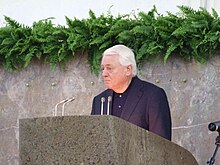Alexander Kluge
| Alexander Kluge | |
|---|---|

Kluge in 2008.
|
|
| Born |
14 February 1932 Halberstadt, Province of Saxony, Germany |
| Occupation | Author, film director |
| Website | www.kluge-alexander.de |
Alexander Kluge (born 14 February 1932) is a German author, philosopher, academic and film director.
Kluge was born in Halberstadt in present-day Saxony-Anhalt, Germany.
After growing up during World War II, he studied history, law and music at the University of Marburg Germany, and the Johann Wolfgang Goethe University of Frankfurt am Main in Germany. He received his doctorate in law in 1956.
While studying in Frankfurt, Kluge befriended the philosopher Theodor Adorno, who was teaching at the Institute for Social Research, or Frankfurt School. Kluge served as a legal counsel for the Institute, and began writing his earliest stories during this period. At Adorno's suggestion, he also began to investigate filmmaking, and in 1958, Adorno introduced him to German filmmaker Fritz Lang, for whom Kluge worked as an assistant on the making of The Tiger of Eschnapur.
Kluge directed his first film in 1960, Brutalität in Stein (Brutality in Stone), a twelve-minute, black and white, lyrical montage work which, against the German commercial (Papa's Kino) cinematic amnesia of the prior decade, inaugurated an exploration of the Nazi past. The film premièred in 1961 at what would become the showcase for the new generation of German filmmakers, the Westdeutsche Kurzfilmtage (now known as the International Short Film Festival Oberhausen) in Oberhausen, Germany.
Kluge was one of twenty-six signatories to the Oberhausen Manifesto of 1962, which marked the launch of the New German Cinema. That same year, with filmmakers Edgar Reitz and Detlev Schleiermacher, Kluge established the Ulm Institut für Filmgestaltung, to promote the critical and aesthetic practices of Young German Film and the New German Cinema.
...
Wikipedia
